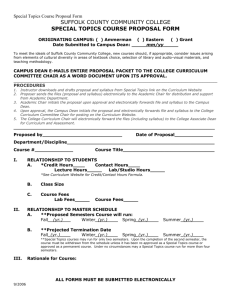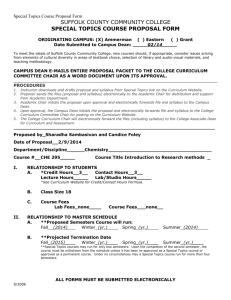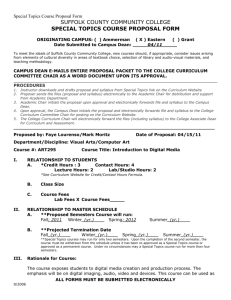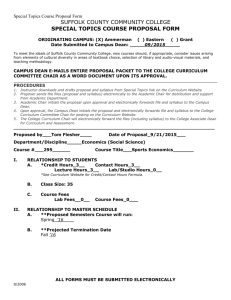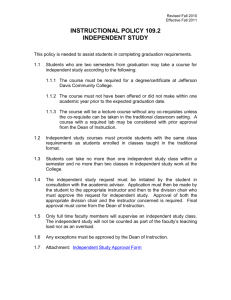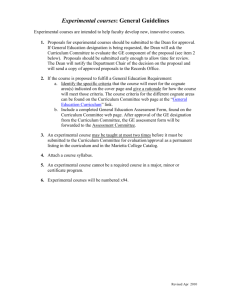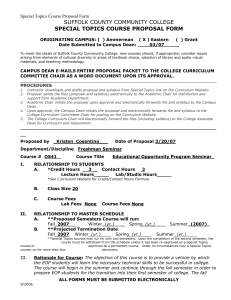International Law - Suffolk County Community College
advertisement
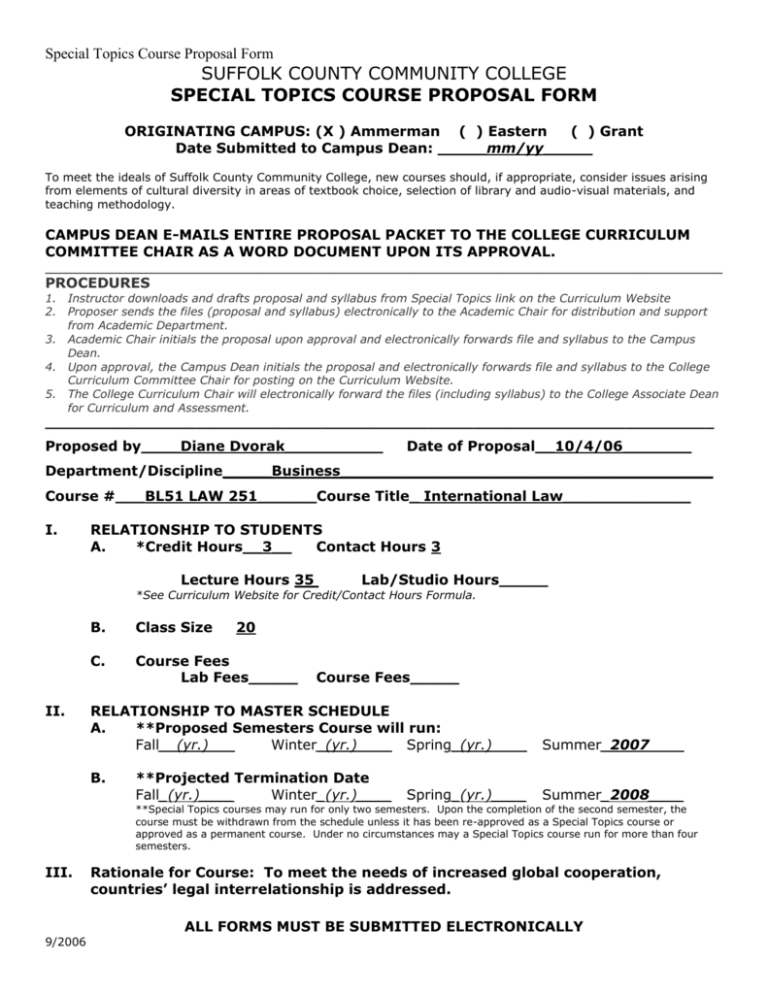
Special Topics Course Proposal Form SUFFOLK COUNTY COMMUNITY COLLEGE SPECIAL TOPICS COURSE PROPOSAL FORM ORIGINATING CAMPUS: (X ) Ammerman ( ) Eastern ( ) Grant Date Submitted to Campus Dean: _____mm/yy_____ To meet the ideals of Suffolk County Community College, new courses should, if appropriate, consider issues arising from elements of cultural diversity in areas of textbook choice, selection of library and audio-visual materials, and teaching methodology. CAMPUS DEAN E-MAILS ENTIRE PROPOSAL PACKET TO THE COLLEGE CURRICULUM COMMITTEE CHAIR AS A WORD DOCUMENT UPON ITS APPROVAL. ____________________________________________________________________________________________________________ PROCEDURES 1. Instructor downloads and drafts proposal and syllabus from Special Topics link on the Curriculum Website 2. Proposer sends the files (proposal and syllabus) electronically to the Academic Chair for distribution and support from Academic Department. 3. Academic Chair initials the proposal upon approval and electronically forwards file and syllabus to the Campus Dean. 4. Upon approval, the Campus Dean initials the proposal and electronically forwards file and syllabus to the College Curriculum Committee Chair for posting on the Curriculum Website. 5. The College Curriculum Chair will electronically forward the files (including syllabus) to the College Associate Dean for Curriculum and Assessment. ___________________________________________________________________________ Proposed by____Diane Dvorak__________ Date of Proposal__10/4/06_______ Department/Discipline_____Business______________________________________ Course #___BL51 LAW 251______Course Title_ International Law_____________ I. RELATIONSHIP TO STUDENTS A. *Credit Hours__3__ Contact Hours 3 Lecture Hours 35 Lab/Studio Hours_____ *See Curriculum Website for Credit/Contact Hours Formula. II. B. Class Size 20 C. Course Fees Lab Fees_____ Course Fees_____ RELATIONSHIP TO MASTER SCHEDULE A. **Proposed Semesters Course will run: Fall__(yr.)___ Winter_(yr.)____ Spring_(yr.)____ B. **Projected Termination Date Fall_(yr.)____ Winter_(yr.)____ Spring_(yr.)____ Summer_2007____ Summer_2008____ **Special Topics courses may run for only two semesters. Upon the completion of the second semester, the course must be withdrawn from the schedule unless it has been re-approved as a Special Topics course or approved as a permanent course. Under no circumstances may a Special Topics course run for more than four semesters. III. Rationale for Course: To meet the needs of increased global cooperation, countries’ legal interrelationship is addressed. ALL FORMS MUST BE SUBMITTED ELECTRONICALLY 9/2006 Special Topics Course Proposal Form IV. Description of Course: Study of International Law as the normative representation of the system of values common to all societies. The framework of this course will recognize that states are the principal actors in the legal system. The topics addressed will include human rights, group rights, the treatment of aliens, and international crimes. Important areas of comparative law in the traditions of Romano-Germanic civil law and Anglo-American common law will be presented. The course examines recurring problems caused by private cross-border disputes and current emerging solutions for solving such disputes. Class direction may include treatment regarding laws and policies behind business practices of the European Union. V. Approvals Department Approval_______________ Date_______________ Academic Chair William F. Connors, Jr. Campus Dean Approval_____________ 11/30/06 Date_______________ Campus Dean ALL FORMS MUST BE SUBMITTED ELECTRONICALLY 9/2006 Special Topics Course Proposal Form SPECIAL TOPICS • COURSE SYLLABUS I. Course Number and Title: BL51 International Law II. Description of Course: Study of International Law as the normative representation of the system of values common to all societies. The framework of this course will recognize that states are the principal actors in the legal system. The topics addressed will include human rights, group rights, the treatment of aliens, and international crimes. Important areas of comparative law in the traditions of Romano-Germanic civil law and Anglo-American common law will be presented. The course examines recurring problems caused by private cross-border disputes and current emerging solutions for solving such disputes. Class direction may include treatment regarding laws and policies behind business practices of the European Union. No prerequisite. (3 credit hours) III. Course Objectives: (What should students learn as a result of taking this course and how will they demonstrate that learning?) The law faculty will assist business and non-business majors to achieve the desired learning outcomes listed below. In addition, the faculty will provide an opportunity for all students to develop, improve, expand and practice their written and oral communication, problem solving, collaborative, hypothetical application, research and decision-making skills. To that end, instruction will be directed at introducing students to: the capacity to recognize when an international law problem exists, the ability to identify jurisdictional concerns, the impact that human rights issues have on our shrinking world, and the extent that legal intervention may occur in foreign disputes. Upon completion of this course students will: Identify the basic concepts and processes of the international legal system. Identify the interaction of state, federal, and international law. Appreciate the relationship between international law and the American legal system. Be aware when an international law problem is presented in current problems. Trace the dominant political, social, economic, and technological forces influencing the evolution of international law. Explain customary international law, treaties, and processes for legal change. Interpret a variety of substantive topics and procedural settings, such as the United Nations, human rights and international trade. Recognize the need for international law as a product of increased international communication, trade and conflict. Understand that international law is a normative system that speaks to our common values. ALL FORMS MUST BE SUBMITTED ELECTRONICALLY 9/2006 Special Topics Course Proposal Form IV. Required Texts and Materials: (List textbooks, newspapers, journals, Internet resources, CD-ROMS, Videos, other teaching materials to be used in the course.) International Law – (author to be selected) Field visitations V. Assessment of Student Learning: (Describe assessment measures, i.e., instruments that measure the attainment of course objectives.) Examinations, problem sets, team exercises, oral presentations, quizzes, briefs, essays, portfolio. VI. Weekly Outline of Topics and Assignments: UNIT ONE: (7 Hours approximately) INTRODUCTION TO INTERNATIONAL LAW AND LAWMAKING Evolution of International Law Custom and Soft Law Natural Law and Jus Cogens Treaties UNIT TWO: (7 Hours approximately) INTERNATIONAL LAW AND DOMESTIC LAW Jurisdiction and Its Limits International Courts and Tribunals The Recognition and Succession of States and Governments Non-Governmental Organizations UNIT THREE: (8 Hours approximately) PROTECTION OF HUMAN DIGNITY International Human Rights Protecting Non-Combatants International Criminal Law International Responsibility and Remedies UNIT FOUR: (8 Hours approximately) CHALLENGES TO INTERNATIONAL LAW The Use of Force Legitimacy, Relevance, and Justice Protecting the International Environment The Law of the Sea UNIT FIVE: (3 ½ Hours approximately) Topics Reflecting Current Issues Balancing Trade and the Environment ALL FORMS MUST BE SUBMITTED ELECTRONICALLY 9/2006
